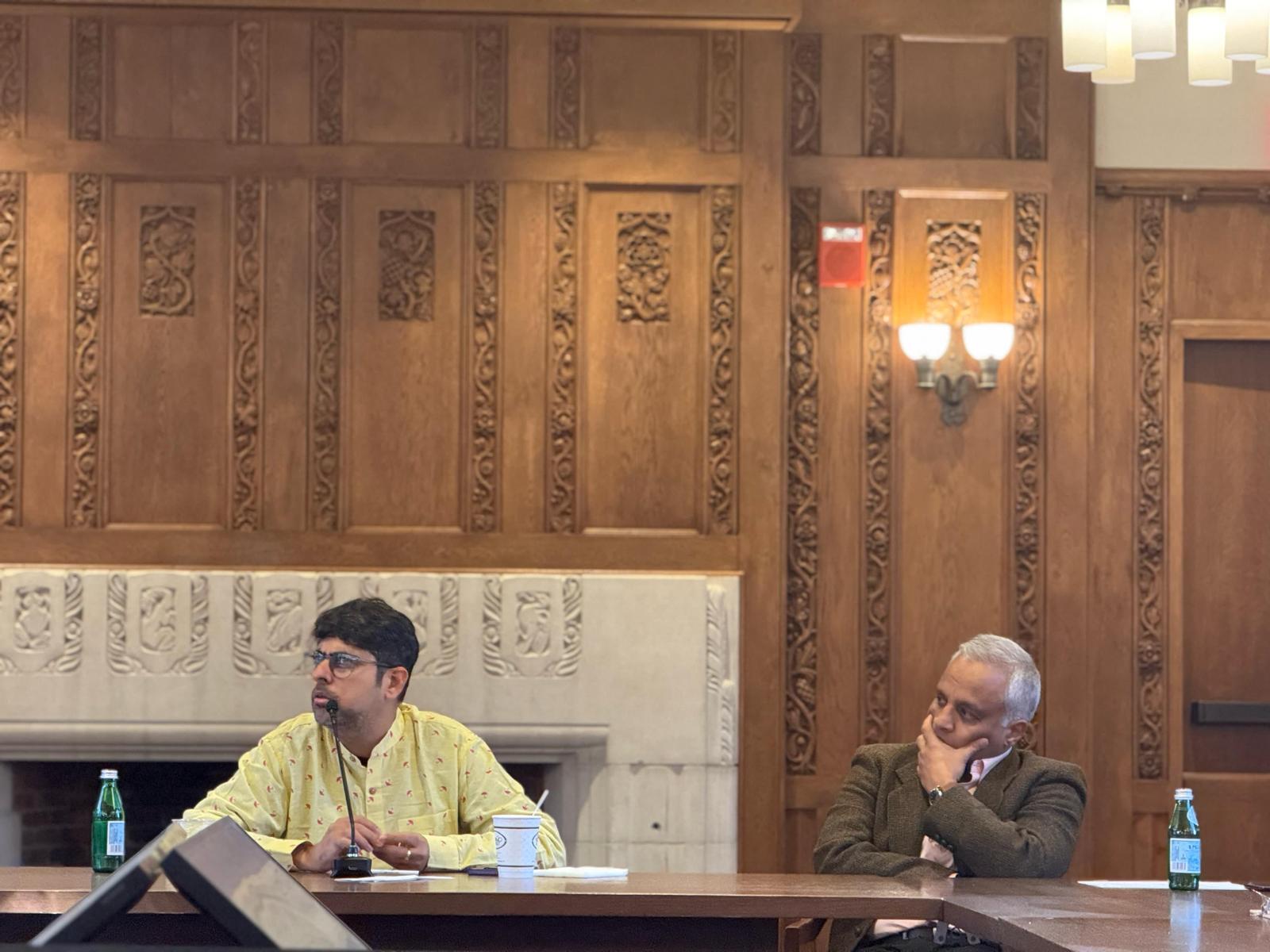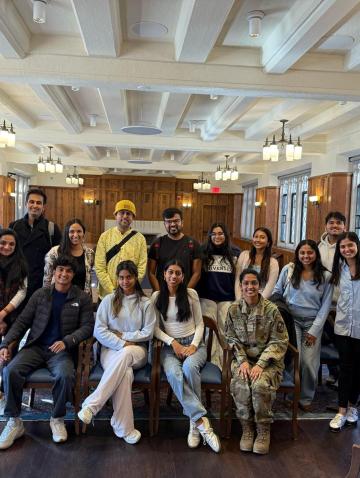When NOTHING MAKES SENSE, Varun Grover Turns to Comedy as Resistance

Varun Grover performing his standup comedy special NOTHING MAKES SENSE at Luce Hall on March 28. Photo by Kamini Purushothaman.
On Friday night at Luce Hall, Varun Grover took the stage with sharp jokes about Hindutva revisionism, Indian liberals, and the contradictions that define contemporary India—delivered to a gleeful crowd of over a hundred attendees.
The show, part of his international stand-up tour NOTHING MAKES SENSE, was split into sections on the roots of these absurdities, why they persist, and what it might take to change them. In the space between laughter and confrontation, Grover has carved out a niche that’s earned him a devoted following in India and beyond.
“I don’t mind if I’m persecuted for what I say,” Grover had mused at a discussion about his life just a day earlier. “But I don’t want to be misinterpreted.”

Varun Grover and discussant Sushant Singh during a discussion about Grover's life as a writer in Humanities Quadrangle on March 27. Photo by Payal Saini.
That bold clarity has become a hallmark of Grover’s storytelling across forms: stand-up, poetry, film, and lyricism. The Mumbai-based creative has won a National Film Award for Best Lyricist, co-written acclaimed works like Masaan and Sacred Games, performed stand-up across the world, and authored two books—the short story collection Paper Chor and the graphic novel Biksu.
But long before earning these accolades, Grover was a child with a story he wished had ended differently. When he was only ten years old, his “fanfiction”—which reimagined a short story he had read with a more hopeful ending—was published in a magazine. Seeing his name in print for the first time, he was hooked on the possibility of writing a better world into existence. Today, that idealism has stayed with him.
“Art is one of the very few things in this world you can control,” Grover said in an interview before his set. “You can't control how your friends behave, you can't control how your governments behave, you can't control how your bosses behave—or even how traffic behaves in your city. But art is a constructed reality.”
For Grover, that constructed reality must be one of hope. He believes comedy—and art more broadly—can help us imagine a future worth fighting for. Comparing stand-up to “the modern op-ed in India,” Grover said that the medium is succeeding at what journalism in India struggles with today.
To make a joke about reality, one must first state what that reality is. “That’s how comedy becomes part of news,” said Grover. But comedy, like journalism, is best with an editorial voice.
“If you’re punching up, you’re doing the morally right thing,” asserted Grover. “And that’s a part of journalism.”
Grover said attendees with different political beliefs have told him his comedy has made them more skeptical of the Indian government. While they disagree with his politics, they keep coming to his shows. That, to him, is a sign that something is working.

Grover meeting with students in Humanities Quadrangle on March 27. Photo by Payal Saini.
Even beyond comedy, Grover never shies away from political engagement. In 2019, he posted a poem on X (then Twitter) in response to the Citizenship Amendment Act and the National Register of Citizens, which disproportionately disenfranchised Muslims. Captioned “Hum Kagaz Nahi Dikhayenge,” which translates to “We Will Not Show Papers,” the poem was both a critique of the government and a call to resist state-imposed injustice.
Grover said the poem metaphorically means that Indians won’t take oppression “lying down.” “It’s about choice, it’s about dignity, and it’s about freedom,” he added.
Speaking to his own privileges as an upper-caste male, he noted that his ability to pursue a creative career was shaped by protections and access many others don’t have.
“If you’re struggling to have two meals a day or are completely cut off from the social connections a person like me has, then it’s very difficult to imagine a life as an artist,” he said.
But Grover said he thinks comedy has a unique potential as an equalizing force that longer-established industries like cinema have failed to cultivate. He explained that, because comedy is still relatively new in India, it’s less susceptible to hierarchies of caste, religion, and class.

Varun Grover performing his standup comedy special NOTHING MAKES SENSE at Luce Hall on March 28. Photo by Kamini Purushothaman.
“There are a lot of diverse voices in comedy right now in India,” he said. “They are the most exciting voices, and I’m hoping they will change the industry.”
Grover hopes to see that diversity spread—and to continue using his own platform to combat the inequalities he sees around him.
For Grover, that resistance is a deeply personal pursuit, whether in cinema or stand-up. “It’s very important to stay rooted in my culture,” he said.
Grover characterized his work as culturally specific, defying easy translation because it encompasses so many layers of his identity—from being born to Punjabi parents who migrated from West Pakistan to growing up as a privileged male in Uttar Pradesh to interrogating those identities in his work.
When asked what he hoped viewers would take away from Friday’s show, Grover concluded that he simply wanted them to “have a good laugh and get a sense of how things are back home.”
In a world of growing division and disinformation, perhaps that was no modest goal. But Grover succeeded at that and more in his three-part act: he also showed his audience that laughter is a powerful tool of dissent.
- Humanity
- Societal Resilience